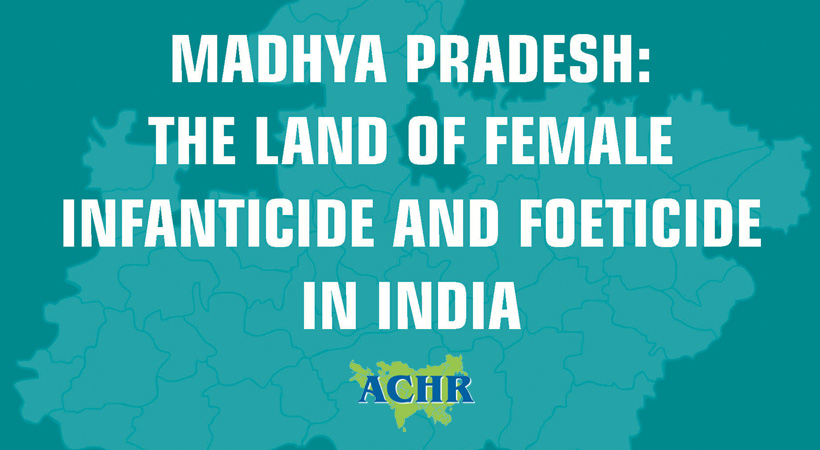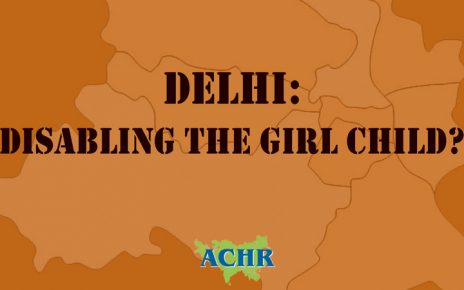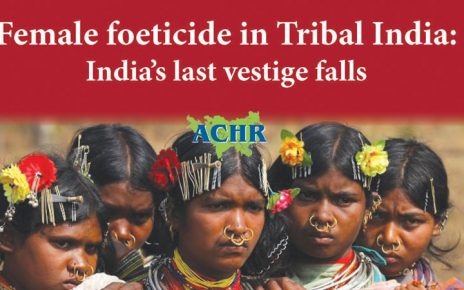India is infamous for female foeticide and female infanticide, the crudest forms of gender based violence. The reasons for the same are well-known: “son preference and the belief that it is only the son who can perform the last rites, that lineage and inheritance runs through the male line, sons will look after parents in old age, men are the bread winners, exorbitant dowry demand is another reason for female foeticide/infanticide”.
Madhya Pradesh has been leading the States in female foeticide and female infanticide in India.
The National Crime Records Bureau (NCRB) of India recorded a total of 2,266 cases of infanticide across the country during 1994-2014.2 Out of these, Madhya Pradesh topped with 537 cases or 24% of all the cases of female infanticide registered in India, followed by Uttar Pradesh with 395 cases and Maharashtra with 286 cases, among others.
The NCRB also recorded 1,663 cases of foeticide in the last 15 years from 2001 to 2015. Once again, Madhya Pradesh topped with 360 cases followed by Rajasthan (255), Punjab (239), Maharashtra (155), Chhattisgarh (135), Haryana (131), Uttar Pradesh (93), Delhi (69), Karnataka (60), Gujarat (52), Andhra Pradesh (30), Himachal Pradesh (25), Bihar and Jharkhand (10 each), Odisha (6), Kerala, West Bengal and Andaman and Nicobar Islands (5 each), Jammu and Kashmir, Sikkim and Telangana (4 each), Assam (2), and Tamil Nadu, Uttarakhand, Chandigarh and Dadra and Nagar Haveli (1 each)
The enforcement of the Pre-Conception and Pre-Natal Diagnostic Techniques (Prohibition of Sex Selection) Act, 1994 (PC&PNDT) remains extremely poor in Madhya Pradesh. Only 2 convictions were secured in Madhya Pradesh from 1994 to September 20145 while 15 cases were pending in courts as of September 2014. Further, only 2 licenses were suspended while only 13 ultra sonography machines were seized or sealed from 1994 to September 2014.6 The laxity on the part of the key officials of the State Government of Madhya Pradesh has reached such a proportion that on 15 September 2014, the Chief Judicial Magistrate Court, Gwalior had to order registration of a case against Madhya Pradesh’s Chief Health Secretary Praveer Krishna, Principal Secretary Suraj Damor and suspension of Health Director Dr. Ashok Sharma for violating the PC&PNDT Act for not holding meetings of the State Supervisory Board.
The Ladli Laxmi Yojana (LLY) launched by Madhya Pradesh Government in 2007, among others, to improve child sex ratio received a lot of attention. As of 11 May 2015, 20 lakh girls were reportedly given benefits under the LLY since its launch in 2007. Six8 of seven states9 which emulated the LLY are Uttar Pradesh, Bihar, Delhi, Chhattisgarh, Jharkhand and Goa.10 As of 16 December 2014, more than Rs 4,500 crore had been deposited in bank accounts of over 18.62 lakh girls under the LLY aimed at protecting the future of the girls and increasing their population in the state.
The Comptroller and Auditor General (CAG) after an audit of the implementation of the LLY scheme in its report placed before the State Assembly on 22.07.2014 held that the benefits under the scheme accrued to the eligible targeted girl children and the operational controls as well as monitoring of the scheme implementation were adequate. The review was conducted for the period 2010-13 by test check of records in 127 Project Offices (PO) covering 7,508 Anganwadi Centres (AWCs) in 15 districts out of 453 POs having 80,160 AWCs in the State. Out of total expenditure of Rs 1900.27 crore incurred on the Scheme during the period 2010-13 in the State, expenditure of Rs 638.16 crore (34 per cent) was covered in audit. The CAG audit pointed out the following problems in the implementation of the LLY: (i) improper maintenance of record of selection of the beneficiaries; (ii) National Saving Certificates (NSCs) issued without ascertaining eligibility of beneficiaries; (iii) non-cancellation of NSCs in case of death of beneficiaries; (iv) delay in issue of subsequent NSCs to the beneficiaries; (v) more than 5 NSCs issued to some beneficiaries; (vi) benefits given to second girl child without ascertaining fulfillment of eligibility; (vii) lack of monitoring and supervision; and (viii) funds earmarked for publicity of the scheme remained unspent.
The statistics collected for the Annual Health Survey (AHS) in Madhya Pradesh, one of the nine States with relatively high fertility and mortality account are not encouraging. As per the sample survey which claims to be the largest demographic survey in the world, the Sex Ratio at Birth (SRB) was respectively 904 during 2011-2012 and 905 during 2012-201313. The SRB is far lower than the Child Sex Ratio (CSR) of 918 girls per 1,000 boys as per 2011 Census. If the existing under-five mortality rate (U5MR) of 48 deaths per 1,000 births14 in India is applied in Madhya Pradesh context, the CSR would fall to 856 during 2011-2012 and to 857 during 2012-2013 which is far below CSR of 918 as per 2011. Though the figures of the AHS are only indicative, they indicate no improvement of the CSR in Madhya Pradesh.
There is no doubt that any programme that seeks to ensure retention of female foetuses ought to address the burden of marriage.
Asian Centre for Human Rights recommends the following to the State Government of Madhya Pradesh:
- Revise Ladli Laxmi Yojana to increase the amount for post birth benefits and scholarship and further additional financial assistance for marriage to be paid to surviving girls;
- Expand the coverage to include families irrespective of income;
- Should be provided to all girl child and not up to two daughters only;
- Undertake specific programme for increasing coverage of all families under the Ladli Laxmi Yojana scheme by connecting the programme with all hospitals;
- Update the website http://www.ladlilaxmi.com/ regularly and provide all relevant information such as list of beneficiaries, funds sanctioned and utilization certificates; and
- Undertake effective measures to monitor and ensure proper implementation of the PC&PNDT Act and the Medical Termination of Pregnancy (MTP) Act.




